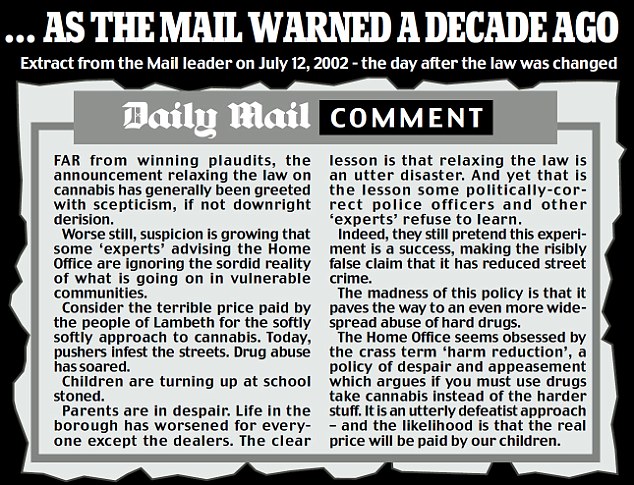When it comes to marijuana decriminalization, much of Europe is way ahead of us — and their policies have failed. Miserably. And yes, that goes for The Netherlands, where they’re working diligently to lower use rates and reverse liberal policies.
Today, the results of two studies made big headlines in England — while here in the United States, headlines were about a Pew survey showing more Americans favor marijuana legalization.
When describing the problems her country has created — and now must address — Mary Brett, who works with a drug-prevention group in England, managed to nail the ignorance abounding here in the U.S.:
“There is no surprise about these findings. We know there are direct links between cannabis and psychosis. Now we have powerful evidence that decriminalisation had disastrous effects. People who push for liberalisation are just not bothered to read the literature.”
Researchers and economists Nils Braakmann and Simon Jones of Newcastle University and Elaine Kelly and Imran Rasul at the Institute for Fiscal Studies examined the effects of England’s decision to downgrade cannabis in 2004. The change in the drug’s scheduling also meant users of marijuana and those possessing it were warned instead of prosecuted. England reversed the policy in 2009 (the year of the rise of medical dispensaries in the United States).
Worth noting from the Daily Mail’s report:
“An experiment in relaxing cannabis laws on the streets of South London led to a rise of 40 percent to 100 percent in the numbers of men admitted to hospital due to their use of harder drugs.
‘We find the depenalisation of cannabis had significant longer-term impacts on hospital admissions related to the use of hard drugs,’” stated the report released by the Institute for Fiscal Studies.
Worth noting from The Telegraph:
“There were also surges in anti-social behaviour and the likelihood of users themselves becoming victims of crime.”
This story, also in The Telegraph, underscores that the United States is falling for many of the same bogus arguments now widely debunked in England.
The institute’s researchers added: “Our results provide a note of caution to moves to adopt more liberal approaches to the regulation of illicit drug markets, as typically embodied in policies such as the depenalization of cannabis.
“While such policies may well have numerous benefits, such as preventing many young people from being criminalised, allowing the police to reallocate their effort towards other crime types and indeed reduce total crime overall, there remain potentially large, offsetting costs related to public health that also need to be factored into any cost benefit analysis of such approaches.”
Update: Newcastle University researcher Nils Braakmann issued a quick statement about his team’s preliminary findings. It’s common when studies such as this are still in early stages and aren’t yet peer-reviewed and published. He reasonably notes there’s a difference between causation and correlation — and that he has found relative increase in marijuana use, rather than absolute increase in use.
In fact, the increase presented is a relative increase between previous consumers and previous non-consumers, pre and post declassification, of between 18-26 percent depending on a number of social and demographic variables. This does not, therefore, represent an absolute increase in consumption, and it is misleading to represent this research in this way.
“This situation does, however, raise some interesting questions for educators. The difference between absolute and relative difference is significant in this case, and shows how important it is to understand these terms before we interpret them in any meaningful way.
“I look forward to sharing the findings when the research is complete, at which point it would be appropriate to interpret the research in a social context.




BUT, then Again, we have
‘This is working’: Portugal, 12 years after decriminalising drugs http://idpc.net/l/ZQ434
Thanks for writing, Mr. Tipton. I’m glad you’ve raised the issue of Portugal, which people have labeled the “dream of decriminalization.”
But before I get to that, there’s this: the citation you’ve provided is from the International Drug Policy Consortium, a pro-drug-legalization organization funded in whole or part (likely whole) by George Soros, the sugar daddy of drug legalization. That’s a lame source of information — and, frankly, I just don’t have time to deal with people who insist on communicating from that parallel universe.
Now, back to Portugal. Proponents of marijuana legalization have mischaracterized the country’s policies — and their effectiveness. Portugal has implemented a modest public health approach consistent with the approaches of many states, counties and cities right here in the U.S. that steer people into treatment and drug courts instead of into jail (note that this stance is supported by several anti-legalization groups, such as Sensible Approaches to Marijuana, or SAM. And note that pro-legalization groups, such as the Marijuana Policy Project, ballyhoo about “forced treatment!” “forced healthcare!” — the very things Portugal is actually doing.). Portuguese officials are even among the first to say they’ve taken many of their cues from programs implemented right here in the United States.
So, Portugal isn’t doing anything unique or radical.
But pro-pot forces have a story to peddle, of course, and they’ve latched on to Portugal and say, “Look! Here’s proof that decriminalization works so well that we can move right on along to legalization!”
Riiiiiiight.
Portugal has never legalized drugs. Its national use rates are up and down depending on the age group and drug being studied. Drug-related deaths are up and down depending on the years studied. So, Portugal’s experience is, unfortunately, generalized and overblown by people who haven’t really dug into the statistics — or who have dug into the statistics, know the facts and just don’t want those getting in the way of their great stories.